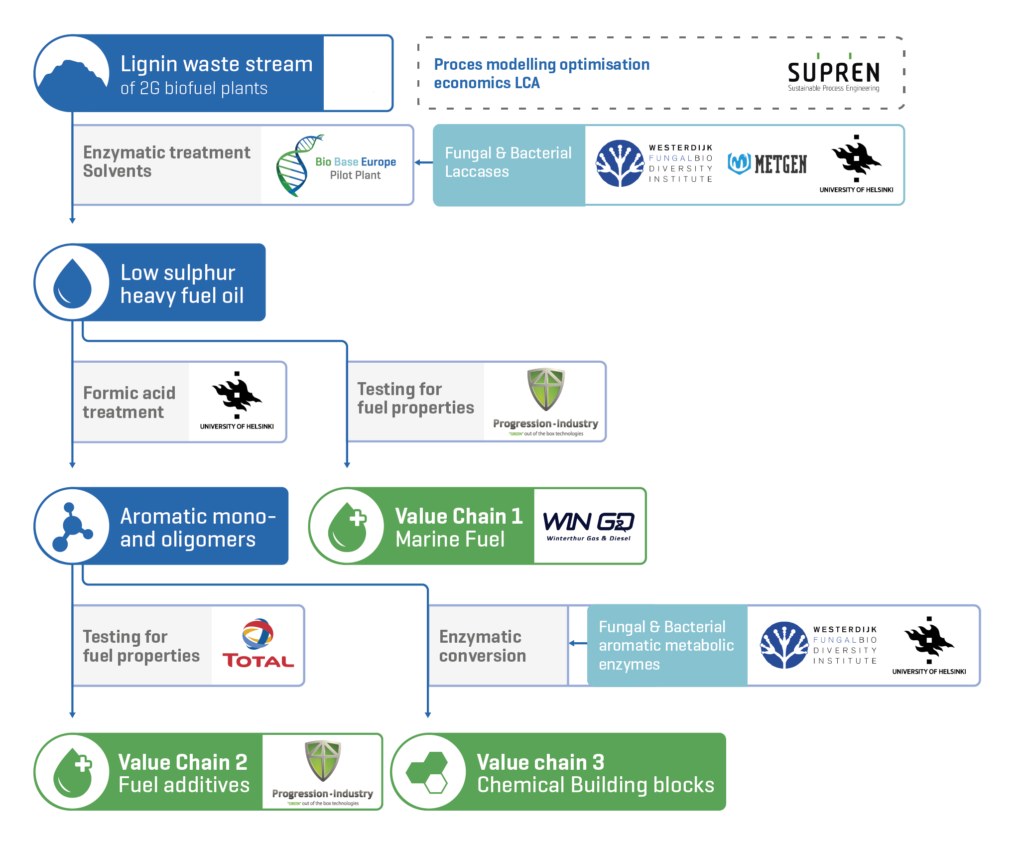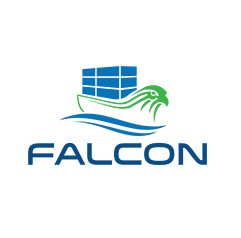Fuel And chemicals from Lignin through enzymatic and chemical CONversion
Conclusions of the Falcon Project summarized in the video below:
The Falcon project explained in an animated video:
CONCLUSIONS of the Falcon Project
The transition to a biobased economy puts strong challenges on researchers and industry to develop sustainable processes. 2G biofuel plants use waste streams as substrates, but themselves generate a new waste stream of lignin-rich sludge that is left after saccharification of the carbohydrates. This waste stream is expected to exponentially increase with an increasing number of 2G bioethanol plants being built, according to a report of the International Energy Agency.
FALCON aims to convert this lignin-rich industrial waste of 2G biofuel plants to higher value products, in particular shipping fuels, fuel additives and chemical building blocks. This would be the next consecutive step in turning waste to products, thus minimizing waste and simultaneously providing new alternatives for fossil resource based processes. The FALCON process is based on enzymatic and mild chemical conversion of the lignin waste stream, providing a more environmentally friendly approach to the production of fuels and chemical building blocks.

FALCON takes full advantage of the lessons learned over the last 150 years in the petrochemical industry with respect to design of the processes. This implies an initial treatment at the 2G bioethanol plant, converting the waste to a lignin oil that can be more easily transported and also directly used as a low sulphur shipping fuel. It will be further converted into fuel additives and chemical building blocks in centralized facilities.
To achieve this, FALCON has formed a consortium of industry (3), SME (4) and academics (2) covering the whole value chain from a 2G biofuel plant delivering the lignin waste to enzyme producers, chemists and process engineers to depolymerize the lignin to oil. End-users are a fuel and chemicals producer and a ship engine developer. This unique combination of expertise and infrastructure will ensure the development of three new value chains with a strong emphasis on the economical sustainability.
CLICK here to go to the official website of the FALCON project.
ACTIVITIES of Bio Base Europe Pilot Plant
- Leader of Work Package 3: Process design and pilot for low sulphur heavy fuel oil production
- Development of the enzymatic depolymerisation of lignin to lignin-oil at lab scale
- Scale up of the depolymerisation process
- Development of refinery process to meet fuel specs for marine diesel (bench and pilot scale)
- Pilot production of depolymerized low-sulphur heavy fuel oil and marine diesel fuel derived there-off for respectively further conversion into fuel additives and chemical building blocks & for validation as marine diesel fuel
PARTNERS
- CBS-KNAW Fungal Biodiversity Centre (Koninklijke Nederlandse Akademie van Wetenschappen, KNAW), NL – COORDINATOR
- University of Helsinki, FI: The Fungal Genetics and Biotechnology group from the Faculty of Food and Environmental Sciences and the Department of Chemistry
- Progression Industry BV, NL
- SUPREN GmbH, DE
- Winterthur Gas & Diesel AG, CH
- Total Raffinage Chimie SA, FR
- Metgen, FI
- Bio Base Europe Pilot Plant, BE
SUPPORTED by:
This project has received funding from the European Union’s Horizon 2020 Research and Innovation Programme under Grant Agreement No 720918.



 webdesign
webdesign